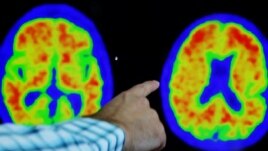27 November 2023
Researchers are renewing efforts to find Alzheimer's disease treatments that remove harmful proteins from the brain. Such vaccines could possibly offer an easier and lower-cost choice for millions of people, several scientists and industry leaders say.
The brain-wasting disease causes thinking and memory problems.
The U.S. government website ClinicalTrials.gov shows that at least seven possible Alzheimer's vaccines are in human testing or have completed such trials. The experimental treatments are designed to use the body's natural defense system to destroy Alzheimer's-linked proteins in the brain. The proteins are beta amyloid and tau.

FILE - A doctor points out evidence of Alzheimer's disease on PET scans at the Center for Alzheimer Research and Treatment (CART) at Brigham And Women's Hospital in Boston, Massachusetts, U.S., March 30, 2023. (REUTERS/Brian Snyder)
The renewed interest in Alzheimer's vaccines follows a promising first attempt more than 20 years ago. That vaccine work halted after six percent of study volunteers developed a life-threatening brain condition called meningoencephalitis.
Researchers then found a safer method using closely targeted synthetic antibodies in patients. These antibodies avoid extreme immune system reaction.
Health care companies Eisai and Biogen launched a new medication called Leqembi and health care company Eli Lilly launched Donanemab. American government drug experts are reviewing the treatments.
The reported success of the drugs has strengthened the theories that amyloid removal is critical to fighting Alzheimer's.
Scientists believe they now understand what went wrong with the first vaccine. They are testing shots they hope will cause an immune reaction without causing too much inflammation.
Dr. Reisa Sperling is an Alzheimer's researcher at Mass General Brigham in Boston. She said she believes vaccines will play an important part as researchers look to prevent Alzheimer's. She said, "I'm very keen that that's where we need to go."
Sperling is leading a trial in people with Alzheimer's proteins in their brains but showing no signs of related problems. She is considering vaccines for her next study in people who have Alzheimer's proteins in their blood, but not enough to show on imaging of the brain.
Alzheimer's vaccines are still in the early stages and will require large, years-long trials to show they work.
But a vaccine given two or four times a year could offer a lower-cost solution than Leqembi. Leqembi is given twice a month. That could expand available treatment among the estimated 39 million people around the world with Alzheimer's.
Dr. Walter Koroshetz is director of the part of U.S. National Institutes of Health that deals with disorders involving the brain. He said of the vaccines, "They could be worldwide, and not that expensive."
I'm Gregory Stachel.
Julie Steenhuysen reported this story for Reuters. Gregory Stachel adapted it for VOA Learning English.
_________________________________________________
Words in This Story
synthetic – adj. made by combining different substances: not natural
antibodies – n. a substance produced by the body to fight disease
immune system – n. the system that protects your body from diseases and infections
inflammation – n. a condition in which a part of your body becomes red, swollen, and painful
keen – adj. very excited about and interested in something
trial – n. a test of the quality, value, or usefulness of something